You — yes, you — might be one of the one in three adults not getting the recommended amount of sleep, waking up groggy, or feeling sleepy during the day at least half the week. Maybe you’re here because you’re curious about melatonin as a sleep aid, or maybe you’re asking for a friend.
Whatever the reason, we get it. Sleep issues are frustrating, and poor rest can negatively impact everything from your physical health to your mood and overall wellness.
While even the best melatonin supplements aren’t a cure-all, they can be helpful tools in certain situations. In this guide, we’ll break down what science says about dosing by age (and sometimes weight), timing, safety, and special considerations. We’ll also explore alternatives if melatonin isn’t the right fit for you.
Let’s tuck into the details!
What Is Melatonin and Why Do People Take It?
Melatonin1 is a naturally occurring hormone produced by the pineal gland in the brain. It’s essential for regulating the body’s sleep-wake cycle: Melatonin levels increase in the evening to signal it’s time to sleep, peak during the night, and drop to very low levels in the morning.
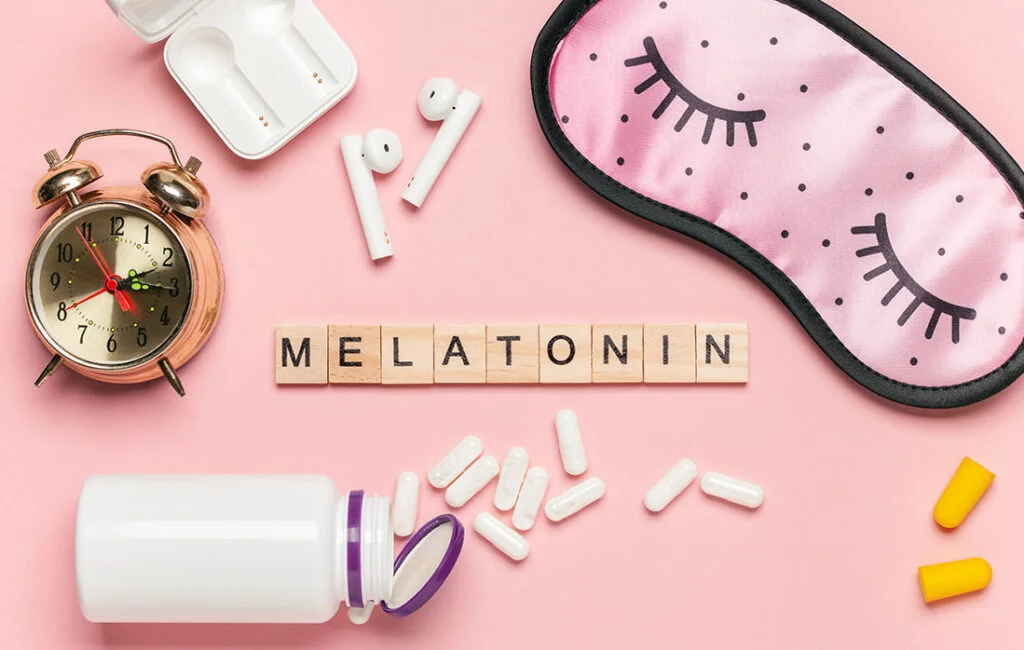
In addition to the natural melatonin your body makes, it’s also available as an over-the-counter supplement. People often take it to:
- Improve sleep onset (fall asleep more easily)
- Increase total sleep time
- Reduce jet lag
- Adjust to irregular schedules, such as shift work
The American Academy of Sleep Medicine (AASM) endorses the use of melatonin for treating REM sleep behavior disorder and circadian rhythm disorders. Researchers are also exploring its potential benefits for1:
- Primary insomnia
- Post-traumatic brain injury
- Age-related insomnia
- Neurodegenerative conditions
- Migraines
If you’re considering melatonin, one of the first questions is, “How much melatonin should I take?” While your body naturally produces small amounts of melatonin, supplementation introduces new considerations, including timing, dose, and specific sleep problems.
General Melatonin Dosage Guidelines
Because melatonin is sold as a dietary supplement in the U.S., there’s no standardized or “official” dose. On top of that, even sleep experts don’t fully agree on its role in insomnia.
The American Academy of Family Physicians (AAFP) identifies melatonin as a first-line option1 in some insomnia cases, such as for older adults. Meanwhile, a 2022 review2 highlights that the American Academy of Sleep Medicine (AASM) cautions against this, recommending behavioral approaches —especially cognitive behavioral therapy for insomnia (CBT-I) — as the gold standard.
That said, while the best way to know if melatonin is right for you is by seeking medical advice, here’s what most research and expert consensus suggest if you’re going to take melatonin:
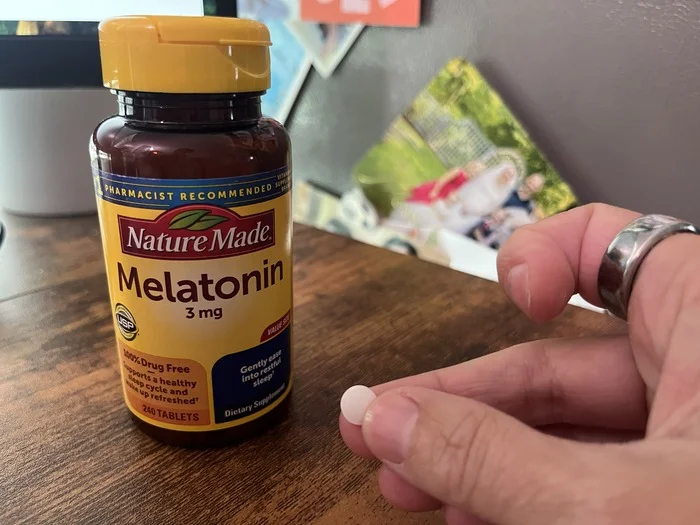
- Start low: Begin with 0.3 milligrams (mg) of melatonin, taken 30 minutes to 2 hours before bedtime, according to a 2022 review in Nutrients3. A small dose lets you see how your body responds and lowers the risk of side effects.
- Typical range: While studies have tested doses from 0.1 to 10 mg1, most benefits seem to peak between 3 and 5 mg of melatonin based on 2024 data4. Higher doses usually don’t improve sleep and may increase grogginess, vivid dreams, or disrupted sleep.
These ranges offer a general starting point. But the “right” dose often depends on age, health status, and the type of melatonin supplement used—which is why leaning on age-based guidelines can be especially helpful.
Melatonin Dosage by Age
Melatonin’s long-term effects aren’t fully understood, and poor sleep is often caused by stress, inconsistent routines, or medical conditions — all things that can usually be improved with healthy habits. Sleep hygiene should always come first, and melatonin should only be used cautiously under medical supervision, especially for children.
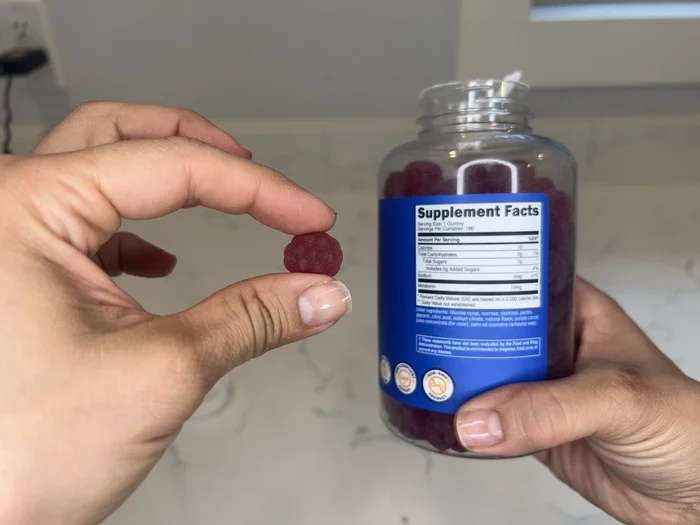
Dosing isn’t one-size-fits-all. Age range, supplement type, and underlying health conditions all influence the appropriate dose. Still, research provides some general age-based guidelines.
Children (Under 12)
For generally healthy children, the proposed dosage5 of melatonin ranges between 0.5 to 5 milligrams, taken 30 to 60 minutes before bedtime.
In the U.S., many over-the-counter products fall within this range, though they vary by brand, age recommendations, and form (gummies, liquids, tablets)5:
- Gummies: 0.5 to 1 mg each, often marketed for ages 2+ (with serving sizes of 1 to 2 gummies).
- Liquids and tablets: Generally up to 1 mg for children ages 3 to 5 and around 2 mg for those ages 6 to 12.
For children with specific sleep disorders, research6 has explored more targeted approaches:
- Delayed sleep phase disorder: 2.5 to 3 mg taken 30 to 60 minutes before desired bedtime
- Attention-deficit/hyperactivity disorder (ADHD): 3 mg or 6 mg (according to body weight) for up to four weeks
- Autism spectrum disorder:
- Under 6 years: start low, around 0.75 to 1 mg, with gradual increases if needed.
- 6 years and older: start with 1.5 mg, increase to 3 mg if no response, then up to 6 mg after four weeks if needed.
While melatonin for kids is generally safe, consulting your child’s pediatrician is the safest approach before starting.
Teens (13–18)
For teens, liquid and tablet formulations typically recommend a dose of around 3 milligrams, taken 30 to 60 minutes before bedtime5. However, teenagers should still start with the lowest dose, or about 0.3 milligrams, before adjusting based on doctor advice.
Targeted dosing for sleep disorders includes6:
- Delayed sleep phase disorder: 5 mg to 10 mg in adolescents taken 30 to 60 minutes before desired bedtime.
- Autism spectrum disorder: same protocol as children 6 and older, starting with 1.5 mg, increasing to 3 mg, then up to 6 mg if needed
Just like children, teens should seek professional guidance, especially since this is a vital time for sexual maturation and growth.
Adults (19–64)
Adults are the most common group to use melatonin, often for occasional insomnia, jet lag, or irregular work schedules.
General guidance is to start low, around 0.3 milligrams, with most benefits peaking between 3 and 5 milligrams. Higher amounts may be used for specific situations, such as jet lag or shift work3.
Older Adults (65+)
As people age, the body’s natural melatonin production declines, making supplements a bigger consideration. While taking melatonin appears relatively safe, older adults should consult a healthcare professional to ensure proper use and dosing—especially those with liver disease, labile blood pressure, or an increased risk of falls.
When recommended, experts7 advise starting with low doses — typically 0.3 milligrams and up to 2 milligrams, taken about an hour before bedtime. A systematic review8 also recommends that older adults use immediate-release formulations to help mimic the body’s natural circadian rhythm and avoid prolonged high blood levels, which can increase the risk of next-day drowsiness and other risks.
Melatonin Dosage by Weight (When It Matters)
Most melatonin research — and most supplement labels — don’t base dosing on body weight. That said, some studies, particularly in children, have explored weight-based approaches.
For example, one clinical trial in children aged 6 to 12 with delayed sleep–wake phase disorder (DSPS) found that a dose of about 0.15 milligrams per kilogram of body weight, taken 1.5 to 2 hours before bedtime with consistent nightly timing, produced the best results over six nights5.
But here’s the catch: dosing by weight isn’t straightforward. Research shows that heavier children and adolescents, as well as those over age 9, were often prescribed lower doses per kilogram compared to younger or lighter kids. In other words, prescriptions don’t always scale up with body size.
When looking at adults, some evidence5 suggests that people with a higher BMI may need larger doses. This could be because melatonin is fat-soluble and distributes into fat tissue, meaning it may get “diluted” in those with more fat mass. Another theory proposes that some people with obesity may have genes that make their bodies respond less strongly to melatonin.
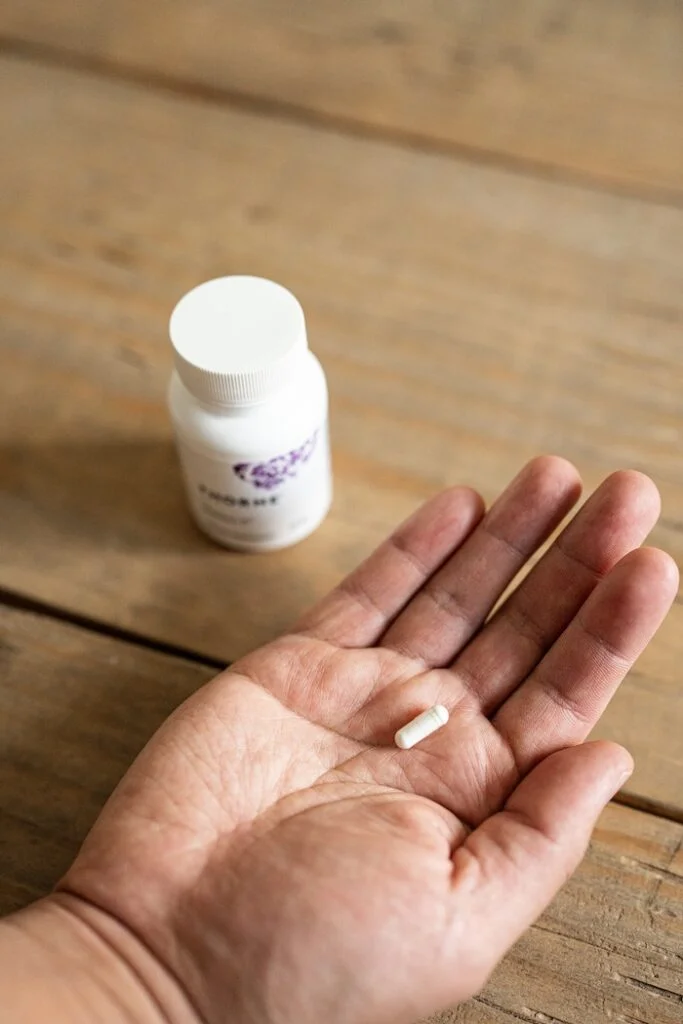
Even with these findings, experts emphasize that the lowest effective dose should always be the starting point, especially in children and older adults.
How and When to Take Melatonin
Melatonin isn’t one-size-fits-all, so it’s a good idea to check in with a healthcare professional before you start. That said, research provides a helpful roadmap for when and how to take melatonin in common situations.
General Sleep
For general sleep support, melatonin is typically taken 30 to 60 minutes before your target bedtime, though larger doses are generally most effective when taken a bit earlier. Most studies recommend starting with a low dose — around 0.3 mg — as there is little added benefit from taking more than 5 milligrams3.
Research3 also suggests that melatonin is most effective when taken after at least 12 hours of wakefulness. Pairing melatonin with a consistent wind-down routine in a dark environment — rather than while scrolling on your phone or watching TV — can further enhance its effectiveness.
Jet Lag
When traveling across time zones — particularly eastward — melatonin can help your body clock adjust and combat jet lag9. Timing is key: taken too early, melatonin can cause daytime grogginess and actually delay the adjustment.
The typical recommendation is to take 0.5 to 5 milligrams at your new local bedtime, starting the first night after arrival and continuing for 3 to 6 nights. Doses above 5 milligrams don’t appear to provide extra benefit, and fast-release formulas often work better than slow-release for jet lag.
Shift Work
For shift workers10, or people who work nights or irregular hours, melatonin can help their bodies adjust to sleep at unusual times. The idea is to take it before your planned sleep period — for example, in the morning after finishing a night shift if you’re preparing to sleep during the day.
Research on melatonin for shift workers is mixed. Some studies show improvements in sleep quality and alertness, while others see little difference compared with a placebo. Yet, short-term use appears safe, and there’s evidence it may help improve cognitive performance on the job for a few weeks.
Since individual schedules and light exposure can dramatically affect how well melatonin works, consistency is key: Try to stick to the same sleep and supplement routine whenever possible.
Safety, Side Effects, and Precautions
Melatonin supplements are commonly used to support sleep, but it’s important to understand potential side effects, interactions, and populations that may need to use it with caution. Knowing these factors can help you use melatonin safely—or decide if alternative sleep strategies are a better fit.
Melatonin Safety
If you’ve ever wondered,“Is melatonin safe?” the short answer is yes — for most healthy adults, short-term use at recommended doses is generally considered safe. What we don’t know yet is the full picture of long-term use, since research there is limited.
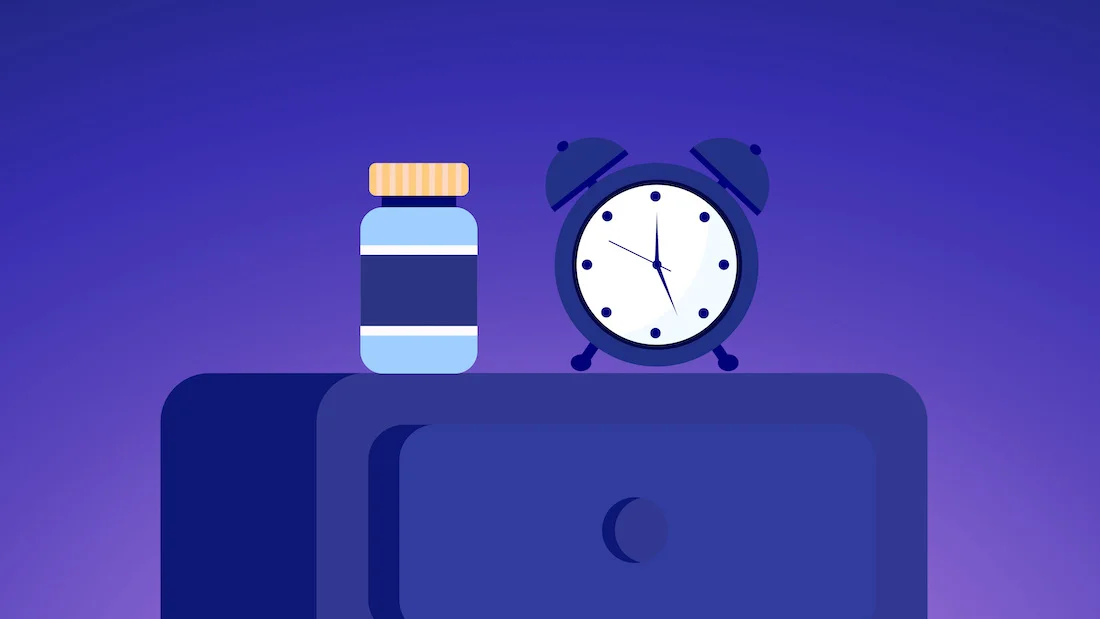
One important piece to keep in mind: dietary supplements aren’t regulated by the U.S. Food and Drug Administration (FDA) the same way prescription drugs are. That means product quality can vary, and some formulas may contain added herbs or ingredients that increase the risk of side effects or interactions.
To lower that risk, look for supplements that carry a trusted third-party certification, such as USP, NSF International, or ConsumerLab. These marks indicate the product has been independently tested for purity, quality, and label accuracy.
Side Effects of Melatonin
Melatonin is generally well tolerated, but mild side effects can occur, especially at higher doses11 more than 10 milligrams. Potential adverse effects include:
- Daytime sleepiness and drowsiness
- Nausea
- Headaches
- Vivid dreams
- Nightmares
For most people, these effects are temporary and often improve when the dose is lowered or the supplement is discontinued.
Severe side effects are very rare, but accidental melatonin overdoses in children have been reported5. Most cases resolve without serious complications, but it’s a good reminder that melatonin—like any supplement—should be stored safely out of reach of kids.
Drug Interactions
Melatonin can interact with several medications and supplements, including3:
- CYP1A2 inhibitors: Melatonin is metabolized by the liver enzyme CYP1A2. Concurrent use with strong inhibitors — such as the anti-depressant medication fluvoxamine — may increase melatonin levels.
- Sedatives: Combining melatonin with these medications can cause excessive sedation.
- Other interactions: Melatonin may also be affected by medications, supplements, or nutrients that influence blood thinning, blood sugar, blood pressure, sedation, seizure control, mood, or immune function.
Because melatonin can affect people differently depending on their medical history and current medications, check with a healthcare professional before taking.
Who Should Avoid or Use Caution with Melatonin
Certain populations should either avoid melatonin or use it only under medical supervision1:
- People with autoimmune conditions, such as rheumatoid arthritis or post-organ transplant
- Individuals with liver or kidney impairment
- Pregnant or breastfeeding women
- Children
- Older adults
- Those taking prescription drugs
For these groups—or anyone who prefers non-supplement approaches—sleep can often be improved through consistent sleep hygiene, stress management, and exposure to natural light, without relying on melatonin.
Alternatives to Melatonin
Since good sleep habits often resolve mild issues without the need for supplements, experts recommend trying natural strategies first, such as prioritizing sleep hygiene, incorporating sleep-supportive foods, and managing stress.
Prioritize Sleep Hygiene
Sleep hygiene refers to the set of habits and behaviors that promote better sleep. Regular practices to support a good night’s rest include:
- Maintaining a consistent sleep schedule — even on weekends — to keep your body’s internal clock on track.
- Limiting exposure to screens and bright lights in the hour before bed.
- Avoiding late-night caffeine or alcohol.
- Creating and maintaining a bedtime routine.
- Being active throughout the day to promote natural sleepiness at night.
- Getting daytime light exposure to regulate your circadian rhythm.
Incorporate Sleep-Supportive Foods
Nutrition influences every system in the body, including sleep. To help encourage relaxation and support your sleep-wake cycle, try adding foods to help you sleep into your nutrition rotation:
- Tart cherries or cherry juice: a natural source of melatonin.
- Nuts and seeds: rich in magnesium, which helps regulate brain chemicals involved in sleep.
- Fatty fish: supports serotonin production, a precursor to melatonin.
- Turkey: high in tryptophan, which converts to serotonin and then melatonin in the brain.
- Kiwi: contains antioxidants, vitamins C and E, serotonin, and folate, all of which are linked to improved sleep.
Manage Stress and Promote Relaxation
Stress can leave you tossing and turning at night, so managing it is vital for improving your sleep. Help your body reduce stress with these relaxation techniques:
- Deep box breathing
- Meditation
- Progressive muscle relaxation
- Gentle stretching
Conclusion
Sleep challenges are common, with roughly one in three adults battling sleepless nights. While melatonin can help improve sleep, keep these key points in mind:
- Consult a professional: Always seek guidance from a healthcare provider before starting melatonin.
- Start low: Begin with 0.3 mg to gauge tolerance and increase as needed. However, most benefits peak between 3 and 5 mg.
- Avoid excessive doses: Higher amounts, especially 10 milligrams or more, are rarely necessary and may cause side effects like next-day grogginess or vivid dreams.
- Timing matters: Take melatonin 30 to 60 minutes before your intended bedtime.
- Consider age and health: Children, teens, and older adults require different dosing strategies, and underlying health conditions or medications can affect safety and effectiveness.
And for your final tuck-in, melatonin can support better sleep, but healthy habits — such as maintaining a consistent sleep schedule and staying active during the day — remain just as, if not more, important.
FAQs
Can I take melatonin every night?
Melatonin is generally safe for short-term, occasional use, but research on long-term use is limited. Ongoing sleep issues should be discussed with a healthcare professional, who can help determine if melatonin is appropriate and guide a safe, effective plan for improving sleep.
Is a higher dose of melatonin more effective?
While studies have tested doses from 0.1 to 10 mg, most benefits appear to peak between 3 and 5 milligrams, suggesting more melatonin isn’t always better. Plus, high doses, especially above 10 milligrams, can increase the risk of next-day grogginess, vivid dreams, and other side effects.
What should I do if melatonin doesn’t work for me?
First and foremost, consult a healthcare professional to rule out underlying medical conditions that could be impacting your sleep. They can also help develop a plan tailored to your needs, which may include establishing a bedtime routine and exploring behavioral approaches.
References:
- Savage, R. A., Basnet, S., & Miller, J.-M. M. (2020, October 23). Melatonin. Nih.gov; StatPearls Publishing. https://www.ncbi.nlm.nih.gov/books/NBK534823/
- Choi, K., Lee, Y. J., Park, S., Je, N. K., & Suh, H. S. (2022). Efficacy of melatonin for chronic insomnia: Systematic reviews and meta-analyses. Sleep Medicine Reviews, 66, 101692. https://doi.org/10.1016/j.smrv.2022.101692
- Minich, D. M., Henning, M., Darley, C., Fahoum, M., Schuler, C. B., & Frame, J. (2022). Is Melatonin the “Next Vitamin D”?: A Review of Emerging Science, Clinical Uses, Safety, and Dietary Supplements. Nutrients, 14(19), 3934. https://doi.org/10.3390/nu14193934
- Cruz-Sanabria, F., Bruno, S., Crippa, A., Frumento, P., Scarselli, M., Skene, D. J., & Faraguna, U. (2024). Optimizing the Time and Dose of Melatonin as a Sleep-Promoting Drug: A Systematic Review of Randomized Controlled Trials and Dose-Response Meta-Analysis. Journal of Pineal Research, 76(5), e12985. https://doi.org/10.1111/jpi.12985
- Shenoy, P., Etcheverry, A., Ia, J., Witmans, M., & Tablizo, M. A. (2024). Melatonin Use in Pediatrics: A Clinical Review on Indications, Multisystem Effects, and Toxicity. Children (Basel, Switzerland), 11(3), 323. https://doi.org/10.3390/children11030323
- Cummings, C., & Canadian Paediatric Society, Community Paediatrics Committee (2012). Melatonin for the management of sleep disorders in children and adolescents. Paediatrics & Child Health, 17(6), 331–336.
- Should Melatonin Be Used as a Sleeping Aid for Elderly People?. (2019). The Canadian Journal of Hospital Pharmacy, 72(4), 327–329.
- Vural, E. M., van Munster, B. C., & de Rooij, S. E. (2014). Optimal dosages for melatonin supplementation therapy in older adults: a systematic review of current literature. Drugs & Aging, 31(6), 441–451. https://doi.org/10.1007/s40266-014-0178-0
- Herxheimer, A., & Petrie, K. J. (2001). Melatonin for preventing and treating jet lag. The Cochrane Database of Systematic Reviews, 2002(1), CD001520. https://doi.org/10.1002/14651858.CD001520
- Sajad Khanjani, Shamabadi, A., Shahin Akhondzadeh, & Ali Akbar Malekirad. (2024). Melatonin for Sleep Quality and Occupational Cognitive Performance in Shift Workers with Low Sleep Quality: A Randomized, Double‐Blind, Placebo‐Controlled Clinical Trial. Journal of Clinical Pharmacy and Therapeutics, 2024(1). https://doi.org/10.1155/2024/8869707
- Menczel Schrire, Z., Phillips, C. L., Chapman, J. L., Duffy, S. L., Wong, G., D’Rozario, A. L., Comas, M., Raisin, I., Saini, B., Gordon, C. J., McKinnon, A. C., Naismith, S. L., Marshall, N. S., Grunstein, R. R., & Hoyos, C. M. (2022). Safety of higher doses of melatonin in adults: A systematic review and meta-analysis. Journal of Pineal Research, 72(2), e12782. https://doi.org/10.1111/jpi.12782

























